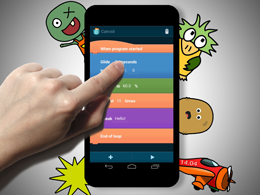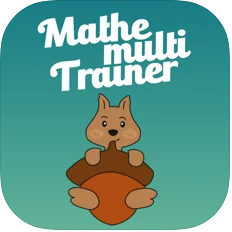Mirza defended successfully his master thesis about „Math trainer as a chatbot via system(push) messages for Android“. Find here his final slides:
[app] Mulitplikationstrainer #ios #tugraz #learninglab
Im Rahmen unseres Learninglab ist wieder eine mobile Applikation für Kinder im Rahmen einer Qualifikationsarbeit entstanden – ein Mulitplikationstrainer:
Expand your multiplication skills.
You can start a short game over ten rounds or an online game.If you reach enough points at the short game, you unlock the next level with higher complexity. Or our Online-System creates your multiplications. The system enables you to see your calculations and errors online.
So you are able to analyze your errors and improve your skills. If you play the online mode, you need an account from the learning lab of the TU Graz.
[publication] School Start Screening Tool #edil21 #research #app
Our contribuation to this year ED-Media 2021 conference about „School Start Screening Tool“ got published. The slides are already here online.
Abstract:
This paper concentrates on the implementation of a new screening method in Austrian schools to assess children and find out if they have any special educational needs in educational areas like phonology, counting, knowledge of letters and numbers and others. The underlying structure of the assignments was developed by developmental psychologists from the University of Graz and the University of Vienna and then implemented as a mobile application for Android tablets. For testing and evaluation purposes, the app’s prototype was first used voluntary by multiple Austrian schools. Furthermore, the mobile application had to be fully functional when offline as well as a central web application had to be developed to give the developmental psychologists access to the screening results. However, the main goal was to develop the application in a way that especially children without sufficient skills in reading and writing are able to understand the assignment’s tasks and to perform input.
[Draft @ ResearchGate]
[article @ LearnTechLib]
Reference: Krassnig, P., Ebner, M. & Ebner, M. (2021). School Start Screening Tool. In T. Bastiaens (Ed.), Proceedings of EdMedia + Innovate Learning (pp. 213-226). United States: Association for the Advancement of Computing in Education (AACE). Retrieved July 26, 2021 from https://www.learntechlib.org/primary/p/219660/.
[presentation] School Start Screening Tool #edil21 #research #tugraz
We were happy to present yesterday our research about „School Start Screening Tool“ at this year „EdMedia + Innovate Learning 2021“ conference.
Klicken Sie auf den unteren Button, um den Inhalt von www.slideshare.net zu laden.
[publication] Designing a Makerspace for Children – Let’s Do It #makereducation #research
Our contribution to the Edurobotics conference 2018 got published right now. According to the title „Designing a Makerspace for Children – Let’s Do It“ we described our first Makerdays 2015.
Abstract:
Abstract of the publication
When makerspaces are designed for children, special motivation and reasoning needs to be made. Within this article, we describe a case study: A temporary four-day open makerspace for about 40 children per day. Motivation, considerations and the development process as well as the actual realization are described and discussed. We comment on how such a space for children and adolescents should be arranged for future studies. As described, considerations in terms of participation, peer tutoring and gender mainstreaming influence the design of the space, the methods used, as well as the general setting.
[article @ publisher’s homepage]
[draft @ ResearchGate]
Reference: Schön S., Ebner M., Grandl M. (2020) Designing a Makerspace for Children – Let’s Do It. In: Moro M., Alimisis D., Iocchi L. (eds) Educational Robotics in the Context of the Mak-er Movement. Edurobotics 2018. Advances in Intelligent Systems and Computing, vol 946., pp. 3-15 Springer, Cham
[publication] Why Will Technology Enhanced Language Learning be Essential for Pupils? #LearningAnalytics
Our publication about „Why Will Technology Enhanced Language Learning be Essential for Pupils?“ got published in the Bulletin of the Technical Committee on Learning Technology.
Abstract:
The availability of personal digital devices in schools and at home are offering new ways of engaging students in the area of language learning. In this publication, we present a new approach on writing and blogging for children aged 8 to 12 years, which is especially helpful for those who struggle with the acquisition of German orthography. On a web-based platform the pupils can write essays and blog them later on. Combined with learning analytics methods we offer individualized feedback during the process of writing and a training database with appropriate exercises to support the students‘ autonomous learning.
[Article @ Journal’s Homepage]
Reference: Ebner, M., Ebner, M., Edtstadler, K. (2019) Why Will Technology Enhanced Language Learning be Essential for Pupils?. Bulletin of the Technical Committee on Learning Technology. 2019/1. pp. 14-17
[poster] Analysis of Misspellings in German Orthography in Grade 3 to 6 #iderblog #learninganalytics
At this year European Dyslexia Autumn Seminar 2018 in Munich, Germany Konstanze Edstadler introduced our IDeRBlog-project. Here you can find our poster:
Klicken Sie auf den unteren Button, um den Inhalt von www.slideshare.net zu laden.
[presentation] Designing a Makerspace for Children – Let’s Do It #makerdays #making #research
Thanks a lot to Maria who did the presentation about our contribution „Designing a Makerspace for Children – Let’s Do It“ at this year edurobotics conference in Rome. Here you can find the slides:
Klicken Sie auf den unteren Button, um den Inhalt von www.slideshare.net zu laden.
[publication] It’s in your pocket: A MOOC about programming for kids and the role of OER in teaching and learning contexts #imoox #mooc #tugraz
Our publication about „It’s in your pocket: A MOOC about programming for kids and the role of OER in teaching and learning contexts“ at this year Open Education Global Conference in Delft got published right now.
Abstract:
Programming is considered as an essential skill in the 21st century. Visual programming languages and age-appropriate development environments allow an easy entry into this field. Nevertheless, it is very challenging to bring those skills in a very short time frame to schools, to their teachers, and to school children themselves. Therefore, Graz University of Technology started a Massive Open Online Course named “Learning to code: Programming with Pocket Code” which is intended to teach coding skills to school children as well as teachers in a very fast, flexible and effective way. The learning content within the course is published under an open license to allow the reuse, modification and dissemination of the materials in different teaching and learning contexts. In this research work, we will present structure and concept of the MOOC. A special emphasis will be given on how the MOOC can be used in school and on the fact, that the content can be disseminated in a variety of ways.
[Link to article @ ResearchGate]
[Link to article @ Conference Proceeding Database]
Reference: Grandl, M., Ebner, M., Slany, W., Janisch, S. (2018) It’s in your pocket: A MOOC about programming for kids and the role of OER in teaching and learning contexts.In: Conference Proceeding Open Educational Global Conference 2018. p. 9. Delft, Netherlands
[imoox] Start: Learning to Code – Programming with Pocket Code #imoox #pocketcode
 We are happy, because the first round in englisch language starts today. The MOOC „Learning to Code: Programming with Pocket Code“ is explicitly aimed at schoolchildren. But be aware that we do not want to train the whole world as computer scientists. On the contrary, we simply want people to understand how the world of tomorrow works, so that they can help shape the world of tomorrow. So register and join it for free.
We are happy, because the first round in englisch language starts today. The MOOC „Learning to Code: Programming with Pocket Code“ is explicitly aimed at schoolchildren. But be aware that we do not want to train the whole world as computer scientists. On the contrary, we simply want people to understand how the world of tomorrow works, so that they can help shape the world of tomorrow. So register and join it for free.
There are many prejudices and fears about programming. With the help of Pocket Code, particularly children will gain initial experience with programming. A simple and visual user interface enables a playful implementation of your own ideas.
The course is designed for children and young people (age group 10-14 years) as well as teachers of all subjects. The main content includes creating your own games, interactive animations and apps with Pocket Code. At first, the structure and functionality of the app get presented. The participants learn how to use basic programming concepts such as conditionals, variables, events or parallelism. It is up to the children whether they take the course on their own or together with their parents.
How can you join? Simply at any time, just register at iMOOX for free and go to the course page and join – have fun.


